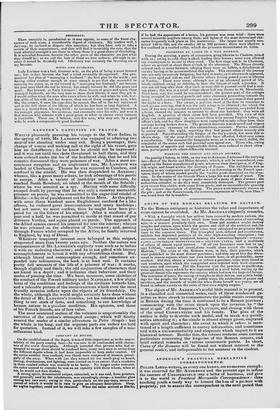COINS OF THE ROMANS RELATING TO BRITAIN.
To the Roman antiquary or historian the value and importance af coins cannot be overrated. As Mr. AKERMAN elegantly remarks, "With a foresight which has seldom been evinced by modern nations, the Romans celebrated those deeds which have been the admiration of succeeding ages, in a manner peculiarly their own. Time and accident might destroy temples and statues, upon which the genius and skill of the architect and the sculptor had been lavished, but their coins were calculated to perpetuate their fame to the remotest times. The triumphal arch, defaced and overthrown, exhibits but disjointed portions of its once high-sounding inscription ; but numerous coins remain uninjured, bearing the sententious legends—IVDAEA• CAPTA —VICTORIAR •BRITTANNICAE— AEGYPTO • CAPT•, and a multitude of others of almost equal interest. If all our historians were lost to us,' says Gibbon, 'medals and inseriiations would alone record the travels of Hadrian.' The coins of the Romans were, in fact, their gazettes, which were published in the most distant provinces; and they are at this day disco- vered in remote regions, where our own records have, in all probability, never reached. Did they obtain a victory or reduce a province, coins were issued in vast numbers, upon which the vanquished were depicted with their characte- ristic arms and costume. Did the Emperor visit the province as pacificator, coins appeared, upon which he was represented in a civil habit, raising up the prostrate female who represents the country which had won the impetial favour. The remission of taxes, the raising of temples to their deifes, and public build- ings for the people, the forming of public ways, the celebration of games and sacrifices, and the records of traditions when Rome herself was young, are all found in infinite variety on the coins of that once mighty empire."
The object of Mr. AKERMAN'S useful little manual is to present, in a classified and connected series, such of these condensed ga- zettes as were struck to commemorate the public events occurring in Britain during the time it continued to be a Roman. province; commencing with the coins struck upon the invasion by "the most stupid 'S of the Emperors, CLAUDIus, and closing with those of the cruel CONSTANTINE and his family. The plan of the author is fully to describe each medal, and to mark any peculi- arities attending it ; a fac-simile is almost always given, engraved with spirit and character; the event to which it refers is men- tioned at a length sufficient to convey information, and sometimes told with a circumstantiality and eloquence which impart to it an historical interest. Besides this, the volume contains some curious particulars concerning the forgeries of the Roman coiners, and brief critical remarks on various numismatic points. In short, Coins of the Romans will be found not without interest to the general reader, and indispensable to the amateur or the student.


























 Previous page
Previous page